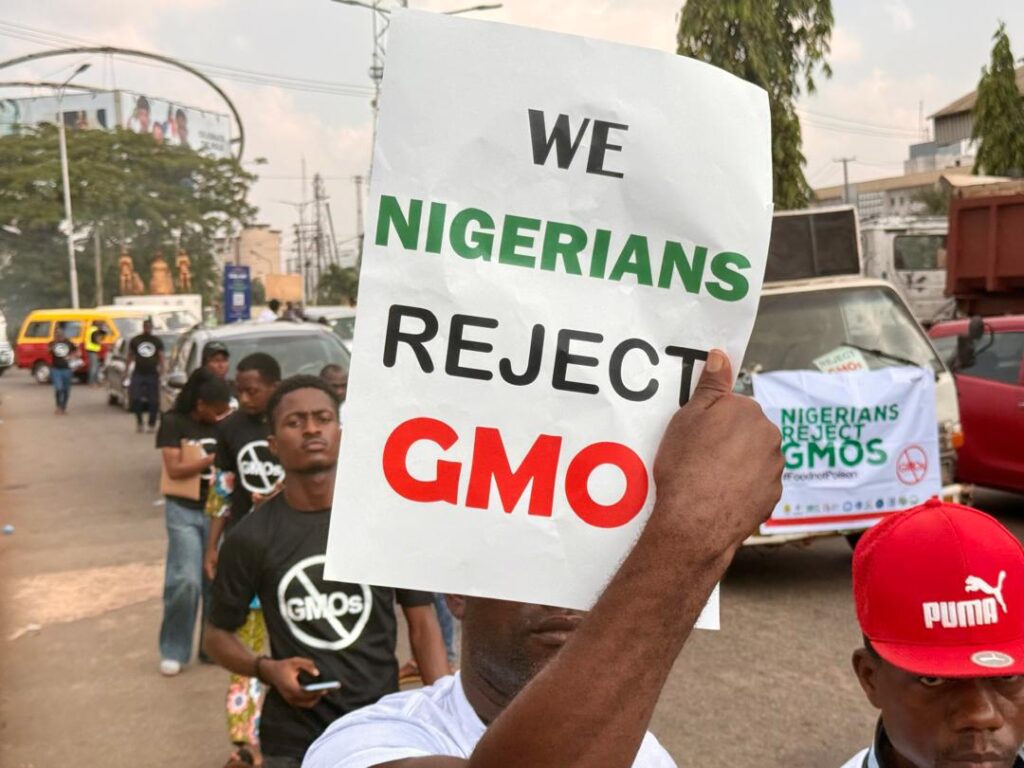By Queen Kunde
On December 13, 2024, a powerful wave of resistance swept across Nigeria as thousands of concerned citizens, experts, and activists gathered in ten states to demand the ban of Genetically Modified Organisms (GMOs) in the country. The grand rallies were organized by the Health of Mother Earth Foundation (HOMEF) and the GMO-Free Nigeria Alliance, drawing participants from diverse backgrounds, including farmers, medical practitioners, civil society organizations (CSOs), researchers, nutritionists, legal experts, women, and youth groups. Their collective message was clear: Nigeria must reject GMOs in favor of sustainable agricultural practices like agroecology, which can ensure food sovereignty, protect the environment, and safeguard public health.
The rallies, which saw a massive turnout in Rivers, Edo, Katsina, Plateau, Oyo, Lagos, Cross River, Enugu, Jigawa States, and the Federal Capital Territory (FCT), featured advocacy visits to government houses, ministries, and other relevant institutions. Participants voiced their concerns over the introduction of GMOs in Nigeria, particularly focusing on the risks to biodiversity, soil health, food security, and the potential corporate control over the country’s food system.
A Call for a Ban on GMOs
At the heart of the rallies was the demand for a complete ban on GMOs in Nigeria. For many activists, the push for a ban comes from a growing sense of urgency about the future of Nigerian agriculture and the country’s ability to feed its own people. Dr. Nnimmo Bassey, the Executive Director of HOMEF, emphasized that GMOs are not the solution to Nigeria’s food insecurity.

According to Dr. Bassey, the introduction of genetically modified crops, such as GM cotton, has not led to any significant improvement in yields or farming efficiency, particularly when compared to traditional, locally grown varieties.
“In September 2024, the National Cotton Association of Nigeria (NACOTAN) reported that their members did not see any significant increase in cotton yields after using GM seeds,” Dr. Bassey explained. “In fact, after four years of using GM cotton, they noticed that no other plants could grow in the fields where the GM cotton had been planted, raising concerns about soil degradation and loss of biodiversity.”
Dr. Bassey went on to explain that one of the biggest issues with GMOs is that they often come with a catch: farmers are unable to replant seeds from their harvest. This forces them to buy new seeds every season from large corporations, exacerbating farmers’ dependency on corporate seed suppliers and undermining local economic growth.
“This is a form of neo-colonialism,” Dr. Bassey declared, “It’s a corporate capture of our food system, and it’s something we shouldn’t take lightly.”
The Socio-Economic Risks of GMOs
Another major concern raised during the rallies was the issue of food labeling and public awareness. Barr Ifeanyi Nwankwere, the National Coordinator of the GMO-Free Nigeria Alliance, highlighted that GMOs approved in Nigeria are not currently being labeled, which leaves consumers in the dark about the origin of their food. He pointed out that many Nigerians buy food in informal markets, where food is sold in basins or cups, and labeling GMOs is practically impossible.
“The socio-economic context of Nigeria makes food labeling ineffective,” Nwankwere said. “The current regulatory framework for biosafety in Nigeria has serious flaws. The National Biosafety Management Agency (NBMA) lacks provisions for strict liability and public participation in decision-making, which is essential for transparency and accountability.”
Nwankwere also criticized the composition of the NBMA’s board, which includes key promoters of GMOs, such as the National Biotechnology Development Agency (NABDA). According to Nwankwere, this presents a clear conflict of interest when it comes to approving permits for GM crops.
Global Trends: Countries Rejecting GMOs

As the rallies continued, many speakers pointed to the growing global movement against GMOs, citing examples of countries that have already implemented bans or restrictions. In Abuja, Mariann Bassey-Orovwuje, Deputy Director at Environmental Rights Action, noted that Nigeria is not alone in its concerns about GMOs. Countries such as Russia, Mexico, Uganda, and 23 others have either partially or fully banned GMOs, citing various environmental and health risks.
Bassey-Orovwuje highlighted the recent decision by Mexican courts to ban GMO corn, emphasizing the environmental risks posed by genetically engineered crops. “The Mexican courts ruled that GMO corn poses a risk to the country’s rich diversity of native corn,” she said. “This kind of legal action reflects the growing concern worldwide about the environmental harm caused by GMOs.”
In South Africa, after a prolonged legal battle, the country’s Supreme Court ruled that Monsanto’s drought-resistant maize had not undergone adequate safety assessments. The court found that the maize had been approved without considering evidence from independent experts about its potential health risks.
Health Concerns: GMOs and Public Safety
The health implications of GMOs were another key point of focus at the rallies. During the event, a study conducted by HOMEF was referenced, which revealed that over 50 imported packaged food products on Nigerian shelves contain genetically modified ingredients. These products, including cereals, vegetable oils, spices, ice cream, and cake mixes, are widely available in Nigerian markets, often without clear labeling to inform consumers.
“The lack of transparency in food labeling is troubling,” said the Director of Programs at HOMEF. “Our survey across 10 Nigerian cities in 2018, 2019, and 2023 revealed that GMOs are pervasive in our markets, even though the public is largely unaware of the risks they pose.”
One of the most alarming reports discussed during the rallies came from an Iranian study, which found that GMO soy caused significant damage to internal organs such as the liver and kidneys in rats during a medium-term feeding test. So far, there is no evidence that the NBMA has conducted similar safety tests for GMOs approved for use in Nigeria, raising serious concerns about the lack of rigorous scientific evaluation.
A Vision for Agroecology and Food Sovereignty
Amid the growing resistance to GMOs, there was a strong call for an alternative approach to agriculture—one that focuses on agroecology. Agroecology, which emphasizes sustainable farming practices that work in harmony with nature, was highlighted as a solution to Nigeria’s food security challenges.
Dr. Bassey and other speakers at the rallies argued that Nigeria has the resources and the potential to feed its population without relying on GMOs. “We do not need GMOs to feed our people,” Dr. Bassey said. “We have the land, the knowledge, and the capacity to grow healthy, diverse, and sustainable food. What we need is to invest in agroecology, which promotes food sovereignty and climate resilience.”
Participants at the rallies called on the Nigerian government to invest in agroecology, which would not only strengthen the country’s food system but also create jobs, protect the environment, and empower local farmers. This vision for the future is one where Nigeria’s food production is in the hands of its people, not foreign corporations.
The Future of Nigeria’s Food System
The rallies across the ten states ended with a strong, unified demand: a total ban on GMOs, the nullification of all GMO permits, and a national commitment to promoting agroecology as a path to sustainable food security. The coalition also called for greater public participation in decision-making on biosafety regulations and demanded a more transparent and accountable food system.
The fight against GMOs is not just about food, but about the future of Nigeria’s agricultural independence, public health, and the environment. As these grassroots movements continue to grow, they serve as a powerful reminder that the choices Nigeria makes today will shape the future of its food system—and the health of its people—tomorrow.
The time for action is now. Nigeria has the potential to take control of its food sovereignty, and it starts with rejecting GMOs and investing in sustainable, agroecological alternatives. The fight for a GMO-free Nigeria is a fight for the future of the country’s agriculture, economy, and public health.


